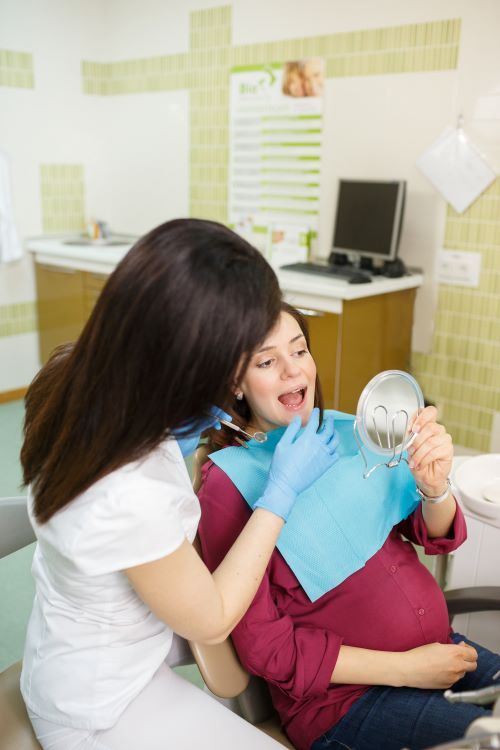Can Pregnancy Affect Dental Health?
Dental health refers to the state of your gums, teeth, and mouth, which is an essential part of your overall well-being. If you’re pregnant, dental health should be part of your prenatal care.
Pregnancy can heighten your risk for dental health problems, which can also affect your baby. Thus, good oral care during pregnancy is one way to ensure that you have a safe journey to motherhood. This way, you can ensure that you’ll give birth to a healthy baby.
Pregnancy and Dental Health
It’s crucial that you check with a Family Dental Health Center to maintain your oral health during pregnancy. The changes that happen to your body during this part of your life can affect your gums and teeth. For instance, the increased levels of hormones, such as estrogen and progesterone, can heighten your risk of getting dental health problems.
During your pregnancy, eating habits also change. You may want to eat certain foods that can affect your oral health.
Flossing and brushing habits may also change because your gums could be tender, or you may get more tired than usual. For other women, these activities can even trigger nausea.
Dental Problems During Pregnancy
The bodily changes that come with pregnancy put you at risk with some dental problems during pregnancy. These include the following:
- Gingivitis. This condition happens when your gums become inflamed. Gingivitis can lead to more serious gum disease if left untreated. Hormonal changes during pregnancy increase your risk for gingivitis. Symptoms of gingivitis include tenderness in the gums, swelling and redness, and gum bleeding.
- Gum Disease. If you leave gingivitis untreated, it can lead to gum disease or what’s called periodontal disease. It’s a serious infection in the gums and bones that support your teeth. This condition can further lead to bacteria getting into your bloodstream, also called bacteremia, which is considered a medical emergency. When you have periodontitis, your teeth may become loose and will have to be extracted. Aside from pregnancy, smoking also places you at risk for periodontal disease.
- Tooth Decay or Cavities. During pregnancy, you are prone to having cavities, which are small, damaged areas on the teeth’s surface. There’s a possibility of passing cavity-causing bacteria to your baby while you’re pregnant or after giving birth. Thus, your baby is also at risk for developing tooth problems later in life.
- Loose Teeth. The increased levels of estrogen and progesterone during pregnancy can lead to brittle bones and tissues, making your teeth loose.
- Pyogenic granuloma. This condition is characterized by lumps on the gums that usually form between teeth. Also called pregnancy tumors, these raw and red lumps can bleed easily. This condition is usually caused by having too much plaque on the teeth. Although these tumors can disappear on their own after giving birth, there are some rare cases when they must be removed by your dentist.
- Tooth Erosion. Some women are prone to morning sickness, which exposes their teeth to stomach acid that destroys the enamel. Nausea and vomiting usually happen during the first few months of pregnancy.
Symptoms of Dental Problems During Pregnancy
The following are common symptoms of dental problems that happen during pregnancy:
- Lumps on the gums
- Mouth sores
- Loose teeth
- Bad breath
- Swollen, red, tender gums
- Receding gums
- Pus on the gum line
- Toothache
If you experience swelling or pain in your gums or teeth, you should call your dentist immediately. You will need treatment if you’re found to have an infection. This will ensure that your baby won’t get affected by an oral infection that’s left untreated.
Treatment of Dental Problems During Pregnancy
If you experience the given symptoms of dental problems during your pregnancy, it’s best to consult with your dental care provider to get treatment. Ensure that the doctor knows you’re pregnant. Depending on the situation, your treatment may need to wait until you’ve given birth.
Here are some treatments deemed safe for pregnant women:
- Local anesthetic. Anesthesia is given to patients during tooth extraction, for example. Local anesthesia works by numbing a certain area of the body to reduce or prevent the feeling of pain. This is considered safe for use during pregnancy.
- Medicine. Some antibiotics and pain-relieving medicines used to treat dental infections are safe to use during pregnancy. These medicines can be given by your dentist to help with your dental problem. Whatever prescription your dentist gives you, it’s best to have it checked with your prenatal provider first to ensure its safety.
Prevention of Dental Problems During Pregnancy
While you can be treated for any dental problems during pregnancy, it’s best to avoid these problems and keep the safety of the baby in mind. Here are some steps to do to help prevent the above-mentioned dental problems:
- Brush your teeth twice and floss once daily. Flossing and brushing are the most important steps of your dental hygiene to prevent oral problems. When you floss and brush your teeth regularly, it helps get rid of plaque to keep your gums and teeth healthy.
- Use antacids if you can’t brush. Some women can’t brush their teeth because of vomiting. If you have this problem, you can use antacids to counter the buildup of plaque in your mouth. You can combine one teaspoon of baking soda with a cup of water to create a homemade rinse. This solution will help neutralize the acids in your mouth.
- Limit sweets. During pregnancy, it’s best to control your cravings for sweet foods, which are a common cause of tooth decay and plaque formation. Instead, focus your diet on healthy foods such as lean meat, fruits and vegetables, pasta, whole-grains, and low-fat dairy products. Avoid drinking sweetened fruit juices and other sugary drinks. The nutrients from healthy foods will help in the healthy and proper development of your baby. Your growing baby will need protein, calcium, and vitamins to make their teeth grow healthy.
- Avoid smoking. Smoking during pregnancy is dangerous for you and your growing baby. It will increase your risk of having tooth decay because of plaque and tar buildup. Worse, smoking can also lead to low birth weight and other health problems in your baby.
- Get regular dental checkups. During pregnancy, continue getting regular dental care. Inform your dental care provider of your pregnancy to help determine the right kind of treatment for your condition.
Final Thoughts
Dental care during pregnancy is an important part of maintaining both your baby’s and your own health. Proper dental hygiene, regular dental checkups, avoiding smoking, and eating healthy foods will help prevent dental problems during pregnancy.




